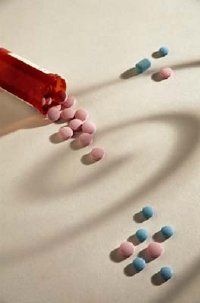High blood pressure -- and by extension, heart disease -- is the leading cause of death among Americans. Fortunately, there are a number of safe and effective blood pressure medications that can vastly reduce a patient's risk for the many grave consequences of hypertension.
At the bottom of this page, we group the most common blood pressure medications by type. We also provide links to articles that clearly explain the effect each drug has on the body, its possible side effects, and any dangerous interactions the patient should be aware of before filling a prescription.
Advertisement
Naturally, with a condition as serious as high blood pressure, it is important to work closely with your doctor -- but it is equally important to be knowledgeable about all of your treatment options and consequences.
ACE-Inhibitors
ACE, or angiotensin converting enzyme, inhibitors block the formation of a hormone that causes blood vessels to narrow or constrict.
- Benazepril (Lotensin)
- Enalapril (Vasotec)
- Fosinopril (Monopril)
- Moexipril (Univasc)
- Quinapril (Accupril)
- Ramipril (Altace)
- Trandolapril (Mavik)
Alpha-Blockers
Alpha-blockers relax certain muscles in the body that can constrict or tighten blood vessels. Relaxing these muscles can improve blood flow and lower blood pressure.
- Doxazosin (Cardura)
- Terazosin (Hytrin)
Beta Blockers By reducing nerve impulses to certain parts of the body, beta-blockers reduce the body's need for oxygen-rich blood and, ultimately, the heart's workload.
- Atenolol (Tenormin)
- Betaxolol (Kerlone)
- Metoprolol (Lopressor or Toprol)
- Propranolol (Inderal)
- Timolol Maleate (Blocadren)
Calcium Channel Blockers
Calcium channel blockers slow the absorption of calcium into the muscle cells, which widens blood vessels and leads to greater oxygen delivery to the heart.
- Amlodipine (Norvasc)
- Diltiazem (Cardizem, Dilacor, or Tiazac)
- Felodipine (Plendil)
- Isradipine (DynaCirc)
- Nifedipine (Adalat, Nifedical, or Procardia)
- Verapamil (Calan, Isoptin, Verelan)
Diuretics
Diuretics, sometimes called "water pills," mainly affect the kidneys and the amount of sodium in your body. With less sodium in the body, there is less water in the blood, which reduces the amount of pressure on the arterial walls.
- Furosemide (Lasix)
- Hydrochlorothiazide (Esidrix, HydroDIURIL, Microzide, or Oretic)
- Spironolactone (Aldactone)
- Triamterene (Dyrenium)
Vasodilators
Vasodilators actually widen, or dilate, the blood vessels by relaxing the muscle in the vessel walls. This allows for an easier flow of blood and lower blood pressure.
- Captopril (Capoten)
- Clonidine (Catapres)
- Irbesartan (Avapro)
- Losartan (Cozaar)
- Nitroglycerin (Nitrogard, Nitroglyn, Nitrolingual, Nitrong, NitroQuick, or Nitrostat)
- Perindopril (Aceon)
- Prazosin (Minipress)
- Telmisartan (Micardis)
- Valsartan (Diovan)
For more information on blood pressure, including its causes and treatments, try the following links:
- How Heart Disease Works tells you more about this health epidemic and how to avoid becoming one of its statistics.
- Though the symptoms of heart disease are undetectable to the naked eye, there are methods you and your doctor can use to find out if you are at risk. Learn more by reading How Diagnosing Heart Disease Works.
- There are also steps you can take in your everyday life to lower your blood pressure. Find out what they are in Home Remedies for High Blood Pressure.
- Cholesterol is key factor in heart disease. Learn how to separate the good cholesterol from the bad in How Cholesterol Works.
- If high cholesterol is a problem for you, the sound advice in Home Remedies for High Cholesterol can help you bring your numbers down.
This information is solely for informational purposes. IT IS NOT INTENDED TO PROVIDE MEDICAL ADVICE. Neither the Editors of Consumer Guide (R), Publications International, Ltd., the author nor publisher take responsibility for any possible consequences from any treatment, procedure, exercise, dietary modification, action or application of medication which results from reading or following the information contained in this information. The publication of this information does not constitute the practice of medicine, and this information does not replace the advice of your physician or other health care provider. Before undertaking any course of treatment, the reader must seek the advice of their physician or other health care provider.
Advertisement
